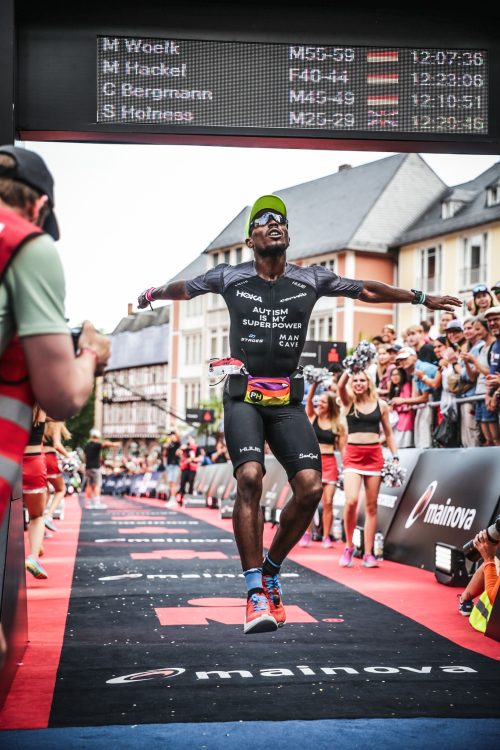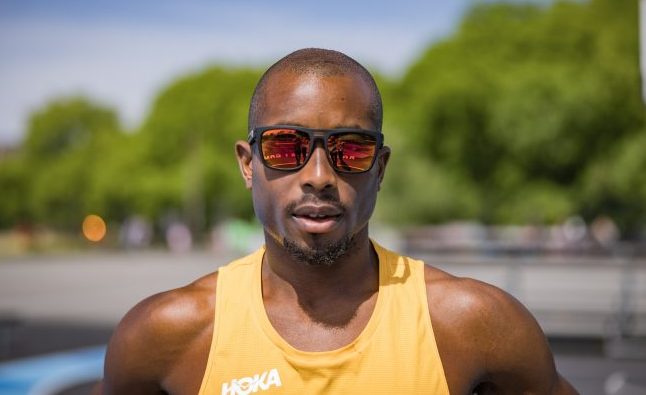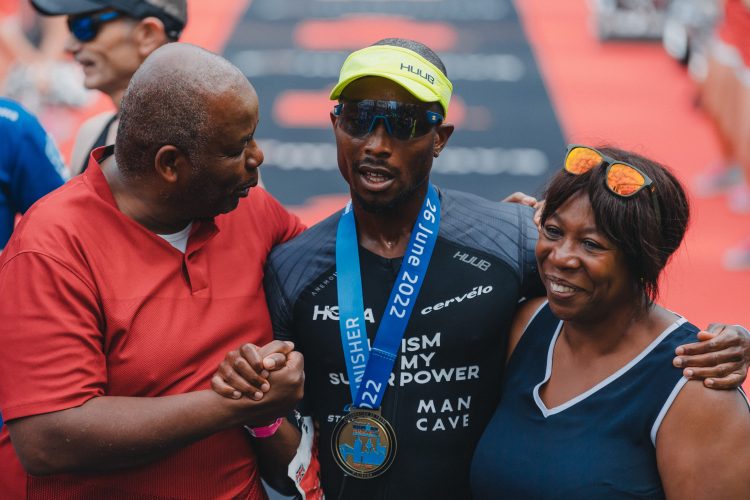Products You May Like
Ironman World Championship finisher Sam Holness reveals his dream to become the first openly autistic professional triathlete…
Crossing the Ironman World Championship finish line in Kona, Hawaii, earlier this month was “the greatest day” of Sam Holness‘ life.
The 29-year-old completed the 2.4-mile swim, 112-mile bike ride and 26.2-mile run in 13 hours and 15 minutes – a key step, he hopes, on his quest to becoming the world’s first black professional triathlete with autism.
The Kona race was only his second Ironman – his first having been completed in Frankfurt in June. And afterwards, the Londoner “felt pretty cool” – in spite of temperatures “hotter than Jamaica” and intense humidity on the marathon’s hilly route.
Though a dodgy stomach set in, he finished up with “no injuries, no pain, no DOMS [delayed onset muscle soreness]”, all of which has made him more focused on his next goal of hitting a sub-11-hour finish time in 2023.
Related: Fitness and autism – one man’s strength training journey

Sam crosses the finish line at his first Ironman in Frankfurt
It’s an ambitious target. But Sam, who only began triathlons five years ago, is by now well-versed in those. He never considered himself a natural at sport, learning to ride a bike at 14, and only running after leaving university, where he graduated with a 2.1 in sports science.
A decade after his first cycle, he completed his first triathlon, with a half-Ironman following two years later.
Sam Holness: swim, bike, run
Mastering swimming, running and cycling has been life-changing for Sam. And the pursuits perfectly complement the skillset of the neurodiverse, says Tony Holness, his father and coach, as “sport is about repeating, mastering and then delivering”.
He and Sam’s mother, Marilyn, “knew that he was very good at doing repetitive tasks” as a child – everything from lining up his Thomas the Tank Engine trains to learning to touch type at 40 words per minute, aged eight. “We just took that skill set, and converted it into sport.”
Related: Running For Just 10 Minutes Can Boost Mental Performance
Even before sport became a full-time pursuit – Sam trains for 25 hours a week, with a rest day on Fridays – his parents always wanted him to have the same opportunities as his peers. When they told other school parents that Sam was swimming, “they basically said to us, ‘why are you letting him swim? He could drown.’ And our view was, if he can’t swim, he will drown.”
They decided that making sure he learnt to do it right was far safer than believing his disability should bar him from the pool.
Tony understands that parents are skeptical. “They’ve very afraid of what they think their children can [or can’t] achieve,” he says. He saw that same mentality throughout Sam’s childhood. “From school and all the way through the education system, there’s a set of low expectations: ‘don’t push them, they can’t do it’.”
The Holnesses have been “fighting against that all the time”, Tony says. “Anytime they say ‘no’, you have to challenge it.”
Ambitious About Autism
Changing perceptions against parents is one thing, he adds. But beyond that, there persists “this misconception that people who are neurodiverse can’t do things”.
Sam is going some way to changing that, serving as an ambassador for Ambitious About Autism, a charity supporting young people on the spectrum, and being named on the Shaw Trust’s 2020 list of the 100 most influential people with a disability in the UK.
Related: Alex Yee On How He Trains For Triathlon Success
“I hope that my story helps inspire others from diverse, and neurodiverse, backgrounds into triathlon and endurance sports,” he says. “Triathlon has given me so much and with the right support, anyone, no matter what their ability or disability, can also challenge themselves and become healthier.”
Tony points to Michael Phelps, the Olympic swimmer who has Attention Deficit Hyperactivity Disorder [ADHD], and autistic Australian rower Chris Morgan, who won bronze at the London 2012 Games, as further role models for those in the community that sporting success is well within reach.

Sam Holness is aiming for a sub-11-hour Ironman
Medals weren’t the primary goal for getting Sam swimming as a child, though. The Holnesses simply wanted “to get Sam healthy and give him a longer life.” The average life expectancy in the UK for someone with autism is 54; a focus on fitness, his parents have always reasoned, is the best chance of doing that.
Sam’s triathlon ambitions have been Tony’s main focus since 2019, when his job in IT in the banking industry “went to pot”, and he left the corporate world to become Sam’s full-time coach. He took a course in Ironman coaching, and now presides over every aspect of his son’s regime: “I’m his coach, I’m his mechanic, I’m his taxi driver; I do everything,” he says.
Tony also manages Sam’s sponsorship deals – which he currently holds with the likes of Hoka, Huub, Cervelo and SunGod, in part chosen for their sustainability and diversity practices – “so he can focus on being an athlete.”
“Without question, this gig is the best thing I’ve ever done,” says Tony.
Triathlon food and fitness
Tony works out Sam’s fitness and nutrition regimen, which typically consists of a morning and afternoon swim, cycle or run, a two-hour nap to aid recovery, and an evening yoga session, which the athlete does every night. “I do it for stress [relief], [and because] it makes the body more flexible,” Sam says.
Breakfast is often Snack-a-Jacks with peanut butter, and scrambled eggs; there’s chicken wings and rice or sea bass and mixed veg for lunch; a banana, strawberry, almond milk and cocoa powder shake in the afternoon; and curry or roast chicken for dinner, often accompanied by sweet potatoes and sauerkraut.
With both food and fitness, on which they operate on a three-week schedule, Tony can tweak as necessary, depending on how Sam feels; the pair check in every morning before the session begins.
“Because I’m dad and Sam’s living at home with us, I can see if he’s tired, and I can discuss what’s happening [with him] every day. I have that intimate relationship with him with coaching, and it’s very different from having a remote coach, or somebody you see once or twice a week. It’s very, very close.”

Sam’s mum and dad congratulate him at the finish in Frankfurt
Still, tired or otherwise, Sam has never missed a session – nor even complained, his father says. “He’s almost the perfect athlete for anyone to train; he does what he has to do.
And he does it to the best of his ability, every day.” Come rain or snow, Sam is still out in Richmond Park or Wimbledon Common “doing his stuff”, Tony says, reinforcing their mindset that “it’s not practice that makes perfect – perfect practice makes perfect”.
Understanding neurodiversity
Tony points out that while his son’s challenges are quite unlike those he races against, “we’re competing as neurotypical athletes, in everything he does”. Sam can’t enter the Special Olympics, because his IQ is over 75; ditto the Paralympics, because he has no physical disability.
Still, that hasn’t dampened their “two-to-three year schedule to Sam becoming a professional athlete” – nor Sam’s aim of running a sub-3hr 20min marathon, swimming 3.8km in an hour, and getting his FTP (the average number of watts a rider can sustain in an hour) up to 300 watts.
His objective now is to take on races against neurotypical competitors “and do well at it, and really just show everybody that being neurodiverse should not be a barrier to doing sport”, Tony says.
Many of those following Sam’s success are realising the same thing. On his Facebook page there are messages of support from well-wishers, including one from a mother who, having seen Sam’s journey, has rethought her own four-year-old’s future, thanking him for “showing us that anything is possible”.
Having already proven that it is – several times over – a future as a professional triathlete for Sam Holness is surely the next step.
Words: Charlotte Lytton